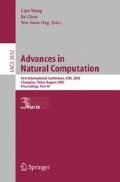Abstract
Enlightened by traditional Chinese medicine theory, a novel genetic algorithm (CMGA), which applies two types of treatment methods of “bu” and “xie” and dialectical treatment principle of traditional Chinese medicine theory to canonical GA, is proposed. The core of CMGA lies on constructing a cure operator, which is dynamically assembled with “bu” operation that replaces normal genes with eugenic genes and “xie” operation that replaces abnormal genes with normal genes. The main idea underlying CMGA is to give full play to the role of guidance function of knowledge to the evolutionary process through the cure operator. The simulation test of TSP shows that CMGA can restrain the degeneration and premature convergence phenomenon effectively during the evolutionary process while greatly increasing the convergence speed.
Access this chapter
Tax calculation will be finalised at checkout
Purchases are for personal use only
Preview
Unable to display preview. Download preview PDF.
References
Wolpert, D.H., Macready, W.G.: No Free Lunch Theorems for Optimization. IEEE Trans on Evolutionary Computation 1(1), 67–82 (1997)
Jiao, L.C., Wang, L.: A Novel Genetic Algorithm Based on Immunity. IEEE Transactions on Systems, Man, and Cybernetics, Part A: Systems and Humans 30(5), 552–561 (2000)
Tang, M.: Knowledge-based genetic algorithm for layer assignment. Australian Computer Science Communications 23(1), 184–190 (2001)
Yang, H., Kang, L.S., Chen, Y.P.: A Gene-Based Genetic Algorithm for TSP. Chinese Journal of Computers 26(12), 1753–1758 (2003) (in Chinese)
Liu, X.: Various theories about traditional Chinese medicine. People’s Medical Publishing House, BeiJing (2001) (in Chinese)
Zhang, J.S., Xu, Z.B., Liang, Y.: Whole Annealing Genetic Algorithm and the Sufficient and Necessary Condition of its Convergence. Science In China (Series E) 27(2), 154–164 (1997) (in Chinese)
Rudolph, G.: Convergence analysis of canonical genetic algorithms. IEEE Trans on Neural Networks 5(1), 96–101 (1994)
Held, M., Karp, R.M.: The Traveling Salesman Problem and Minimum Spanning Trees. Operation Research 18, 1138–1162 (1970)
Held, M., Karp, R.M.: The Traveling Salesman Problem and Minimum Spanning Trees: Part II. Mathematical Programming 1, 6–25 (1971)
Goldberg, D.E., Lingle, R.: Alleles, loci and the traveling salesman problem. In: Proceedings of the International Conference on Genetic Algorithms, pp. 154–159 (1985)
Author information
Authors and Affiliations
Editor information
Editors and Affiliations
Rights and permissions
Copyright information
© 2005 Springer-Verlag Berlin Heidelberg
About this paper
Cite this paper
Wang, CX., Cui, DW., Wang, L., Wang, ZR. (2005). A Novel Genetic Algorithm Based on Cure Mechanism of Traditional Chinese Medicine. In: Wang, L., Chen, K., Ong, Y.S. (eds) Advances in Natural Computation. ICNC 2005. Lecture Notes in Computer Science, vol 3612. Springer, Berlin, Heidelberg. https://doi.org/10.1007/11539902_10
Download citation
DOI: https://doi.org/10.1007/11539902_10
Publisher Name: Springer, Berlin, Heidelberg
Print ISBN: 978-3-540-28320-1
Online ISBN: 978-3-540-31863-7
eBook Packages: Computer ScienceComputer Science (R0)

